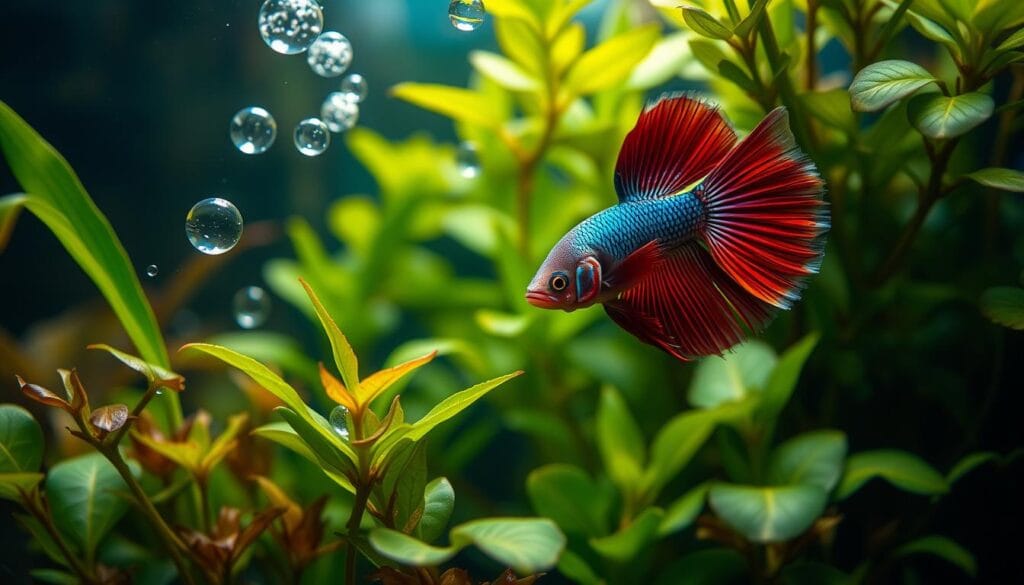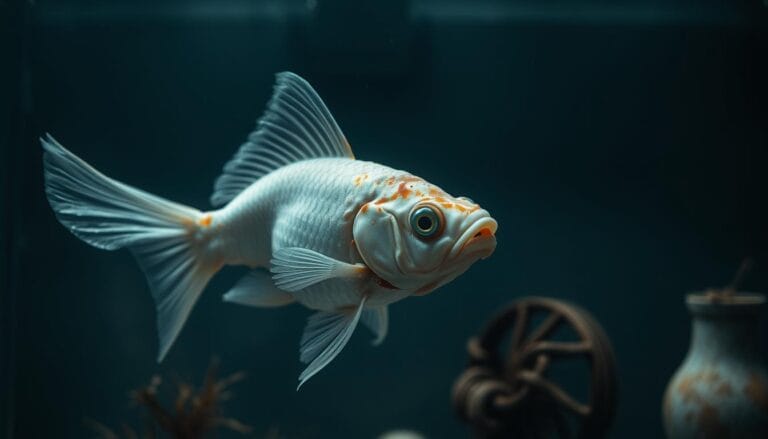Do Betta Fish Sleep? Discover the Facts
Do Betta Fish Sleep? The answer is yes! While their rest patterns differ from humans, bettas need sleep to stay healthy. Observing their behavior—like resting on leaves or slowing down at night—can help you support their natural rhythms.
Ensure they get quality rest by maintaining a calm tank environment, dimming lights after dark, and avoiding disturbances. Understanding their unique sleep habits is key to fostering a thriving, energetic betta.
Table of Contents
Key Takeaways
- Betta fish sleep in short bursts of roughly 20 minutes at a time.
- Betta fish need a light/dark cycle with darkness lasting 50-67% of the time for proper rest.
- Betta fish are light sleepers and tend to sleep every day, similar to humans.
- The optimal temperature for betta fish is around 78-82°F (25-28°C) to maintain proper metabolism and activity levels.
- Understanding betta fish sleep patterns can help you provide the best care for your pet.
- Learning about do betta fish sleep and betta fish sleep patterns can help you identify and fix any issues.
- Betta fish typically require 10-14 hours of light per day to establish a healthy sleep cycle.
Understanding Betta Fish Sleep Patterns
As you watch your betta fish, you might ask how do bettas sleep and what their sleep looks like. Betta fish sleep differently than humans. They don’t have eyelids and their sleep is affected by their surroundings.
Betta fish sleep by resting in place to save energy, which is key for them. They lose color, which helps protect them. You can see them sleeping in many ways, like curled up or lying on their side.
What Defines Sleep in Fish
Sleep in fish means they are less active and less alert to their environment. Betta fish are light sleepers. They wake up easily to avoid predators. This is because they live in a place where they must always be ready to defend themselves.
Differences Between Fish and Human Sleep
Betta fish don’t have a regular sleep schedule like humans do. They can sleep anytime, day or night. Their sleep is affected by things like water temperature, tank size, and hiding spots.
The Science Behind Fish Rest Periods
Studies say betta fish sleep about 12 to 14 hours a day. They take short naps during the day too. It’s important to control their light exposure. Betta fish need 8 to 12 hours of light a day to stay active and not sleep too much. Knowing betta sleeping habits helps you make a better home for your fish.
Do Betta Fish Sleep? The Clear Answer
Watching your betta fish, you might ask how long do betta fish sleep and what their sleep looks like. Yes, betta fish do sleep, and how long they sleep can change. This depends on their environment and health. In the wild, they sleep for about 12 hours of light and 12 hours of dark.
For betta fish sleep duration, they often sleep more during the day if it’s too cold or they’re not active enough. You can see them sleeping among plants or at the tank’s bottom when it’s less light. Several things can affect their sleep:
- Lighting periods: 10 to 14 hours of light per day is recommended
- Water temperature: a stable temperature between 76-82°F (24-28°C) is ideal
- Exercise: providing enough space for your betta fish to swim and exercise
Knowing these factors helps you make a cozy sleep space for your betta fish. By giving them the right conditions, you ensure they get enough rest. This is key for their health and happiness.
Signs Your Betta Fish is Sleeping
Wondering if your betta fish is sleeping or just resting? It’s hard to tell because they don’t have eyelids. But, there are signs to look for. Betta fish can be active at night but also sleep then. You might see them resting on a leaf or near the water’s surface.
Some signs your betta fish is sleeping include reduced activity and less vibrant color. They might take short naps during the day, floating near the tank’s bottom. It’s important to know betta fish sleep mostly at night. Their sleep can change with water temperature and lighting.
Common Sleeping Positions
Betta fish sleep in unique ways, like resting on a leaf or near the water’s surface. They might also sleep floating vertically, with their head up. Make sure your betta has a comfy and safe place to sleep. This includes hiding spots and plants to rest on.
Behavioral Changes During Rest
When sleeping, betta fish move less and are less responsive. They might sleep with their eyes open because they don’t have eyelids. Watch your betta’s behavior to make sure they’re sleeping normally and not stressed or sick.
When Do Bettas Sleep in Their Natural Habitat
Learning about betta fish sleep patterns is key to caring for them well. In the wild, betta fish sleep in short periods at night. They are most active during the day. Their sleep habits are shaped by their surroundings, like dense plants or near the water’s surface.
To make a cozy spot for your betta fish, add hiding places. Use big leafy plants, driftwood, or decorative houses. This helps them relax and sleep better. Some betta fish sleep near the surface, while others prefer hiding in decorations or at the tank bottom.

Here are some tips for a sleep-friendly environment for your betta fish:
- Give them live or artificial plants for security and relaxation.
- Provide a resting spot, like a betta leaf hammock, to reduce stress.
- Turn off tank and room lights at night to help them sleep naturally.
By understanding and mimicking their natural sleep patterns, you can help your betta fish live well. A comfortable environment ensures they get the rest they need.
Creating the Perfect Sleep Environment for Your Betta
To make a cozy sleep spot for your betta fish, think about the tank’s setup. A well-arranged tank with the right conditions is key for your betta’s rest.
Betta fish like a quiet, dark place to sleep. You can make this by adding shady spots and keeping a regular light schedule. Aim for 8 to 12 hours of light each day.
Ideal Tank Conditions
The tank should have water between 76-81 degrees Fahrenheit. The pH should be between 6.5 to 7.5. Keeping these conditions right is vital for your betta’s health and sleep.
Best Resting Spots
Betta fish can sleep in many ways, like curled up or lying on their side. They can even sleep vertically, behind heaters or on ornaments. Having different places for them to rest makes them feel safe and comfy.
Lighting Requirements
Lighting is important for your betta’s sleep. Keeping the light schedule consistent helps them sleep well. This way, your betta can rest and stay healthy.
How Long Do Betta Fish Sleep Each Day
Watching your betta fish, you might think about their sleep habits. How long they sleep can change based on their surroundings and health. Generally, betta fish need 12 to 16 hours of darkness daily for good sleep.
The exact time betta fish sleep is not known. But, they likely sleep in short bursts at night. They might sleep 8-10 hours at night when it’s calm. During the day, they might take short naps. But, sleeping too much during the day could mean there’s a problem.
Factors Affecting Sleep Length
Several things can affect how long your betta fish sleeps. For example, having other fish in the tank can make them more territorial and sleep less. Also, if your betta fish is not healthy, it might sleep more or less than usual. A change in color is a common sign of sleep, as they may turn dull to hide from predators.
Some important factors that can influence betta fish sleep include:
- Environment: A tank with plenty of hiding spots can help reduce stress and improve sleep.
- Lighting: Turning off lights at night can help keep your betta fish’s sleep cycle natural.
- Age: Older betta fish might sleep more because they get less energetic with age.

By knowing these factors and creating a good environment, you can help your betta fish sleep well. This ensures they get the rest they need to stay healthy and happy.
Common Sleep-Related Problems in Bettas
As a betta fish owner, you might face sleep-related problems that harm your pet’s health. These issues can stem from poor water quality, bad diet, and stress. It’s key to spot and fix these problems to help your betta fish rest well.
Some common sleep issues in betta fish include fin rot and swim bladder disease. These can be avoided by keeping water quality high, feeding a balanced diet, and making a cozy resting spot. Adding plants, caves, and tunnels can also help reduce stress and make your betta feel safe.
Here are some tips to prevent betta fish sleep problems:
- Maintain good water quality by regular water changes and monitoring water parameters.
- Provide a balanced and nutritious diet that meets your betta fish’s nutritional needs.
- Create a comfortable environment by adding plants, caves, and tunnels to the tank.
By following these tips, you can help prevent betta fish rest issues and ensure your pet gets quality sleep. Always watch your betta fish’s behavior and health. If you see signs of illness or stress, get professional advice.
The Connection Between Betta Health and Sleep
As a betta fish owner, you want to ensure your pet’s overall health and well-being. Their sleep patterns are key to their health. Betta-fish sleep during the night and take short naps during the day. This is important for their health.
Impact of Poor Sleep on Betta Health
Poor sleep can weaken a betta-fish’s immune system. This makes them more likely to get sick. It can also increase stress, leading to changes in behavior and appetite. To keep your betta-fish healthy, provide a peaceful place for them to sleep.
Monitoring Sleep Patterns
To make sure your betta-fish sleeps well, watch their behavior and appetite. Look for changes in their sleep patterns. Also, make sure their environment is good for sleep.
- Maintaining optimal water temperature between 78° and 80° Fahrenheit
- Providing plenty of hiding places and plants for your betta-fish to rest on
- Avoiding sudden changes in lighting or water conditions
By following these tips and watching your betta-fish’s sleep, you can help them get the rest they need. A healthy sleep environment is key for their health and well-being.
Myths About Betta-Fish Sleep Debunked
If you own a betta-fish, you might have heard some betta-fish sleep myths. These myths can confuse you and impact how you care for your pet. One myth is that betta-fish never sleep, which is false. Like all living things, betta-fish need rest to live. They can nap during the day and sleep for hours at night.
Some think betta-fish don’t sleep because they don’t have eyelids. But this is not a good reason to think they don’t rest. Betta-fish can sleep with their eyes open. They often find a quiet, safe spot to rest. It’s important to know betta-fish rest myths and give your pet a good place to sleep and rest.
Here are some common myths about betta-fish sleep:
- Betta-fish do not sleep because they do not have eyelids
- Betta-fish are always active and do not need rest
- Betta-fish can survive without a proper sleep schedule
It’s key to debunk these betta-fish sleep myths and give your pet a healthy, safe place to live. By understanding betta-fish sleep patterns and providing a good tank and care, you can help your pet be happy and healthy.
Remember, a well-rested betta-fish is a happy and healthy one. By avoiding common betta-fish rest myths and giving your pet proper care and attention, you can help your betta-fish thrive and live a long, happy life.
Conclusion: Ensuring Your Betta Gets Quality Rest
Ensuring your betta fish gets quality rest is key for their health. By creating the perfect sleep environment, you can help your betta thrive. A well-rested betta is happy and healthy.
Give your betta a dimly lit, temperature-controlled tank. Add hiding spots and resting areas. Keep the water quality high and the day-night cycle consistent. Also, feed them high-quality betta-specific food.
By focusing on your betta’s sleep quality and care, you’ll see a vibrant, active fish. Be a responsible betta owner and give your finned friend the rest they need.
FAQ
Do betta-fish sleep?
Yes, betta-fish do sleep, but their sleep is different from ours. They rest in short periods to save energy and stay ready for danger.
How do betta-fish sleep differently than humans?
Unlike us, betta-fish don’t sleep deeply all at once. They take short naps during the day and night. This way, they stay alert and save energy.
What factors affect betta-fish sleep?
Several things can change how betta-fish sleep. Water temperature, tank size, and hiding spots are important. If it’s too cold or they’re not active enough, they might sleep more during the day.
What are the signs that a betta-fish is sleeping?
Signs of betta-fish sleep include resting on plants or decorations. They also stay very quiet and less active. But, it’s key to tell sleep from health problems.
How do betta-fish sleep in their natural habitat?
In the wild, betta-fish sleep in dense vegetation or near the surface. This lets them rest while staying ready to defend themselves.
What are the ideal conditions for betta-fish to sleep?
For betta-fish to sleep well, their tank needs hiding spots and a steady water temperature. Also, a regular day-night cycle with the right lighting is important.
How long do betta-fish sleep each day?
Betta-fish sleep in short periods all day and night. How long they sleep depends on their tank, how active they are, and their surroundings.
What are common sleep-related problems in betta-fish?
Sleep issues in betta-fish include fin rot and swim bladder disease. These can be avoided by keeping the water clean and feeding them a balanced diet.
How does betta-fish health relate to their sleep patterns?
Watching how betta-fish sleep can tell you a lot about their health. Poor sleep can harm their health. So, it’s vital to make their sleep environment good and fix any sleep problems quickly.
Are there any myths about betta-fish sleep?
Yes, one myth is that betta-fish never sleep. But, they do take short rests to save energy and stay alert.
There are no reviews yet. Be the first one to write one.







